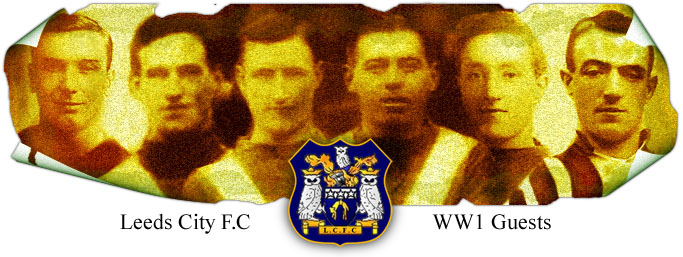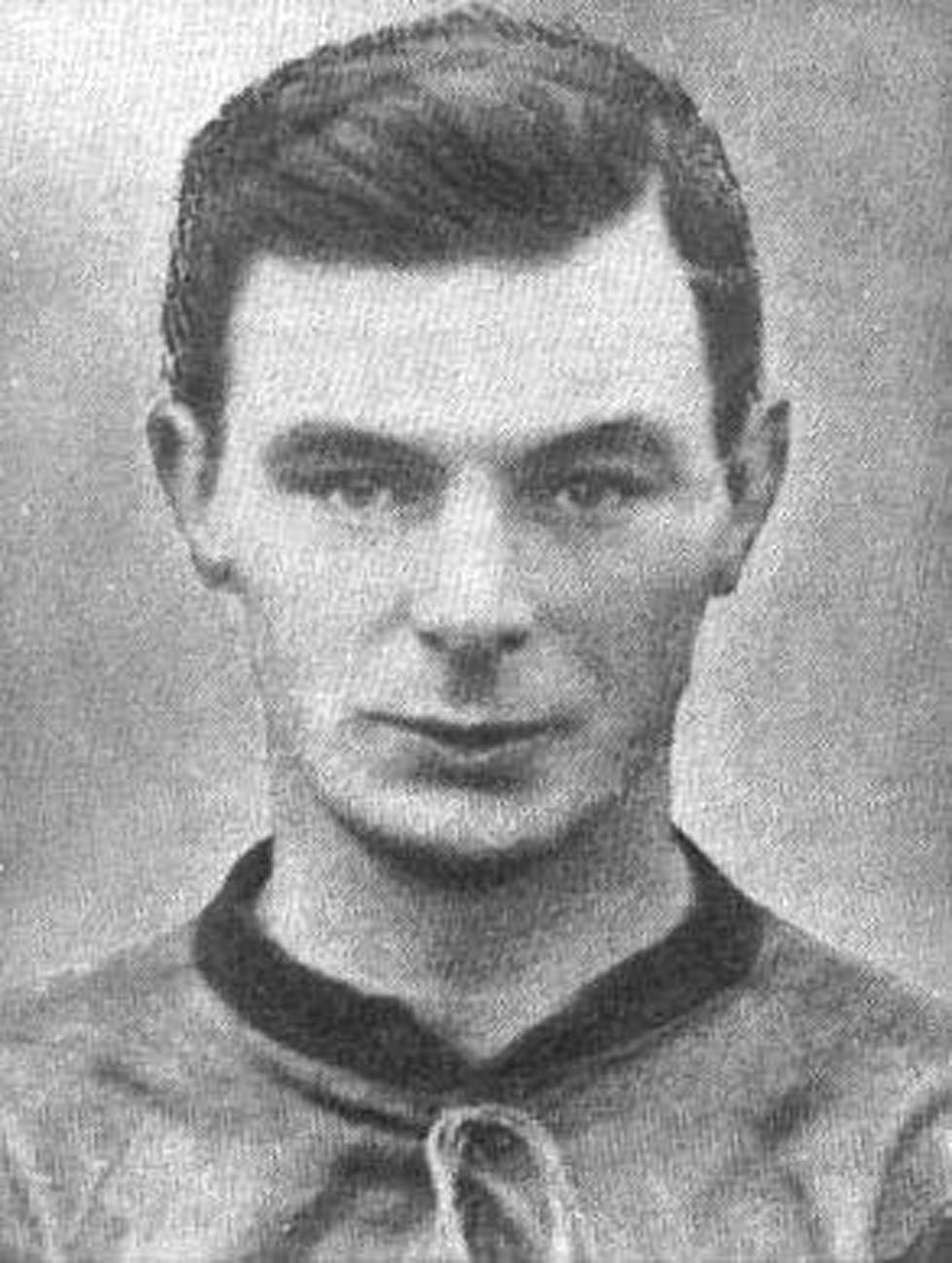

Hibbert: William (Billy)
1918-1919 (Leeds City War-time Guest Player Details)
Outside Right
Born: Golborne, Nr. Wigan, Lancashire: 21-09-1884
Debut: v Stoke (h): 04-05-1918
Height & Weight: 5' 7", 10st. 10lbs (1911)
Hibbert started his career playing school and junior football in his native Lancashire with his home town team Golborne Juniors. He
then played for Newton-le-Willows FC of the Lancashire Combination League when he was just sixteen years old, and then played for
Brynn Central FC, also in the Lancashire Combination, for one season. First Division Bury FC signed Hibbert on 3rd May 1906 as an
inside-right, and it was at Gigg Lane that he rose to prominence. He quickly became a first team fixture and scored regularly as he
played mostly at Centre Forward with a few games at Inside Right and Inside Left. Hibbert was not very tall, but quite diligent and
enthusiastic on the pitch. He soon came to the notice of other clubs on 5th September 1908 when Sunderland came to Gigg Lane in
the First Division. The Shakers ran out 4-2 winners with Billy Hibbert scoring all four of the Bury goals in front of a crowd of 12,000
supporters were on hand to see the goals fly in. He won his only England cap on 2nd April 1910 when Scotland won 2-0 at Hampden
Park. He was also in the FA Team that went on the Tour of South Africa in 1910 subsequent to the game at Hampden Park. He was in
the team on 29th June 1910 as the FA beat South Africa 3-0 in Durban in the Natal Province in which he got all three goals. He was
also on the bench for the other two games against the hosts the first at the Wanderers ground in Johannesburg on 23rd July 1910
where the FA XI won 6-2 and seven days later at Capetown in the Cape Province in a 3-6 defeat for the hosts. In addition to the three
"Tests" They also played another twenty games in various cities and their record was Played twenty-three, won twenty-three, scoring
one hundred and forty three goals to sixteen. He also represented The Football League on three occasions. Being against the Irish
Football League team at Celtic Park in Belfast on 8th October 1910. The Football League won 6-2. On 14th November 1910 he
played for the English Football League against the Southern League at White Hart Lane in a 2-3 defeat and at Ibrox Park, Glasgow,
where they drew 1-1 with the Scottish Football League on 4th March 1911. At Gigg Lane he scored ninety-nine goals, of which seven
were from the penalty spot, and includded six hat-tricks, in one hundred and seventy-eight League games and a further six goals in ten
F.A. Cup appearances before Bury were struggling financially and on the field, and were relegated at the end of the 1911-12 season.
Hibbert had been a consistant scorer in his time at Gigg Lane with twelve goals in 1906-07 and twenty in in 1907-08, twenty-six in
1908-09, twenty in both the 1909-10 and 1910-11 and once in the part season of 1911-12, before leaving for Tyneside. At that point
Bury were desparate to rebuild and finally agreed to sell him. He had scored ninrty-nine League goals and made one-hundred and
seventy-eight League appearances, before joining First Division Newcastle United on 14th October 1911, for a record fee of £1,950.
Seven other clubs had endeavoured to obtain Hibbert's signature, namely Manchester City, whose £1,200 offer was rapidly turned
down, Blackburn Rovers, Bradford City, Tottenham Hotspur, Everton, Chelsea and Middlesbrough. Once more he was thrust into the
spotlight as the Magpies finished third in his first season, He made his debut on 21st October 1911 at home to Blackburn Rovers with
the Magpies winning 4-2. He opened his goal account in his second game a week later when he opened the scoring in a 2-1 away win
over the Wednesday at Hillsborough. He finished the 1911-12 season having played twenty-seven League games and one F.A. Cup
and and had scored fifteen goals in the League, which saw him score twice in in a 4-2 win at Oldham Athletic on Christmas Day and a
hat-tick in a 5-2 home win over Bolton Wanderers five days later. In between those he had also scored in the Boxing Day home draw
with local rivals, Sheffield United. He was not quite as prolific in the 1912-13 season only managing three goals in twenty-three League
games and one in six F.A. Cup games. 1913-14 again was not a year for goal-gathering as he found the net six times in thirty-five
games in the League and his one F.A. Cup tie did not add to his tally. There was a return to more like his goal-scoring potential in
1914-15, the final season as WW1 took over. He scored thirteen in thirty League games and twice in six F.A. Cup-ties. and by the time
the First World War brought an end to the Football League fixtures he had scored thirty-seven goals in one hundred and fifteen
appearances. As Newcastle United refused to play during the Wartime, their players guested for other clubs and Hibbert turned out for
The Wednesday, but when Leeds City were without the services of their star player Clem Stephenson for the vital League Championship
Final Play-offs against Stoke, they turned to Billy Hibbert to fill the gap and so his first two games for Leeds City were at Outside Left in
the games that saw them crowned the Unofficial Champions of England at the end of the 1917-18 season. He made a large contribution
to their victory by scoring the opening goal in the first Leg at Elland Road. He stayed on with Leeds City until just before the Christmas
fixtures in the 1918-19 season. With Leeds City he scored, five times in fourteen appearances and once in two games in the play-offs.
He also played in a War-time International Charity game at Windsor Park Belfast on 12th October 1918 in front of 20,000 in a 0-0 draw.
He then played six games for Hartlepool United in the Northern Victory League making his debut on 1st February 1919 in a 1-2 home
defeat by Middlesbrough, he then featured in three more consecutive games to 22nd February 1919, which saw Hartlepools beaten at
home 0-2 by Scotswood, 2-6 at Sunderland, before registering their first win at home by 6-1 over Durham City. Hibbert finally got on the
scoresheet, when he scored the only goal in a 1-4 home defeat by Darlington, on 22nd March 1919. His best game came in his final
appearance in a 5-0 win at Durham City on 29th March 1919 in which he scored twice to total three goals in six games. On resumption
of the Football League he was once again with Newcastle United, scoring nine times in twenty-four League games, and made two
appearances in the F.A. Cup, without scoring, in what proved to be his final season with the Magpies. His final game was a 0-0 draw at
Maine Road against Manchester City on 24th April 1920. He had played one hundred and thirty-nine League games and scored forty-six
goals while he scored another three goals in sixteen appearances in the F.A. Cup. Bradford City eventually signed their man on 12th May
1920 on a free transfer, and he was at his prolific best in his two seasons there scoring twenty-six goals, of which two were from the
penalty spot in just fifty-three League games. He also scored another two goals in six F.A. Cup appearances. Bradford City were
relegated at the end of the 1921-22 season and Hibbert moved to First Division Oldham Athletic on 21st May 1922. He stayed at
Boundary Park for just one season until the Latics also were relegated. He was the second leading scorer for the club, bettered only by
Jimmy Marshall with six, as they could only score thirty-five in the season. He scored four times in sixteen League appearances and also
played in one F.A, Cup-tie without scoring. He was one of several English players who went to the USA to play in the new American Soccer
League. In 1923 he joined Fall River Marksmen. He made his debut on 13th October 1913 at J.P. Coats and scored the second goal in a
2-2 draw. But, only played four games, scoring once, before moving on to J & P Coats Rhode Island for the rest of that season. He also
played for them for the entire 1925-26 season. He played fifty-six games and scoring twenty-four times. He made his debut at home to
Newark on 5th April 1924 and scored three of the four goals. He maintained his thirst for goals, scoring the the third goal on 26th April
1924 in a 3-2 home win over Brooklyn, he next scored the final goal in a 5-1 win at the New York Giants on 8th June 1924. He played
twelve games and scored four goals in the 1923-24 season. The following season, 1924-25 he scored fourteen goals as J. P. Coats were
seventh in a twelve team League. He scored once on 4th October 1924 in an 8-2 home win over Newark, he got two more on 18th October
1924 in a 5-0 home win over Fleisher. He scored again seven days later in a 2-2 draw at Fleisher. He did not score again until Xmas Day
1924 in a 5-2 home win over Providence. After that he really hit the goal trail on 14th March 1925 he scored J.P. Coats' only goal in a 1-3
home loss to Bethlehem. He scored his team's only goal in a 1-2 home loss to New Bedford on 21st March 1925. He again scored both of
his side's goals in a 2-4 away loss to Bethlehem. On 5th April1925 he again got the only goal in a 1-3 away loss to Providence, as he did on
11th April 1925 in a 1-3 home defeat by the New York Giants.There were positive games as he opened the scoring in a 4-1 home win over
Newark on 18th April 1925 and a week later he scored twice in a 6-1 home win over Philadelphia. He scored fourteen goals in twenty-eight
appearances for the season. He also was with Real Gimnastico in Spain in June 1927. After his playing career had all but finished he was a
coach in the USA, Spain before he returned to Lancashire to play for Burscough Rangers, where he was appointed captain on 7th February
1930. Wigan Borough before moving to Blackpool in 1938. He lived and worked at Blackpool as a fitters labourer at the aircraft factory and
died there on 16th March 1949, aged sixty-four.
| War-time Guest Appearances | Goals |
| |
| Principal Tournament 14 | 5 |
| Subsidiary Tournament 0 | 0 |
| Play-off Finals 2 | 1 |
| Total 16 | 6 |